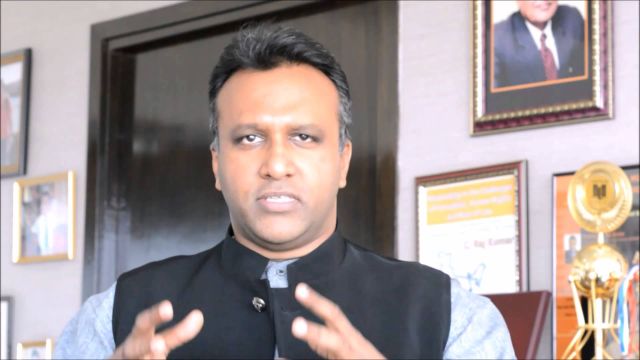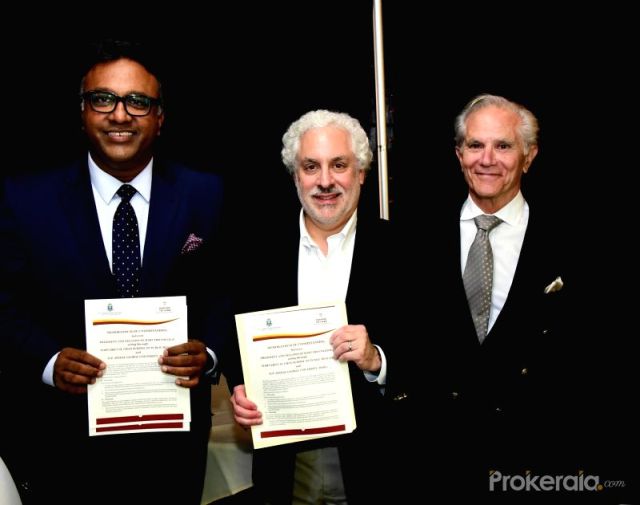
by admin | May 25, 2021 | Corporate, Corporate Buzz
 New Delhi : O.P. Jindal Global University (JGU) on Wednesday said it has opened a research centre dedicated to corporate responsibility and sustainability.
New Delhi : O.P. Jindal Global University (JGU) on Wednesday said it has opened a research centre dedicated to corporate responsibility and sustainability.
The centre housed in JGU in Sonipat, Haryana, aims to deliver knowledge services to higher education institutes, industry and other players in India’s development sectors.
The JGU-Centre for Excellence in Corporate Responsibility and Sustainability (JGU-CECRAS) was announced during a three-day-long “Northern Conclave for Building CSR Partnerships” organised earlier this month in association with the Tata Institute of Social Sciences (TISS) here.
Speaking at the conclave JGU Vice Chancellor C. Raj Kumar pointed out that the growth and evolution of the CSR model in India has not been largely due to corporate commitment to contribute to the development of the community; rather it has more to do with building a positive persona and image, including brand building.
“We need to reimagine the CSR framework for higher education. The impetus should be to translate corporate mission to societal mission. Corporations need to invest in long term social transformation,” Kumar said.
He emphasised the critical role of research in improving the quality of higher education in India and that CSR money could play an important role in augmenting research and innovation to creating the universities of the future.
Inaugurating the conference, Gyaneshwar Singh, Joint Secretary in the Ministry of Corporate Affairs said the ministry was considering an enforcement regime to make corporations in the country more responsible towards the society and environment in which they operate.
The conference brought corporations, non-profit organisations, government entities and higher education institutions on one platform.
—IANS

by admin | May 25, 2021 | Corporate, Corporate Governance, Interviews

Vice chancellor Professor C. Raj Kumar
By Gokul Bhagabati,
New Delhi : With higher education institutions in India, barring a handful struggling to make a mark at the global level, Vice chancellor of O.P. Jindal Global University (JGU) in Sonipat, Haryana, Professor C. Raj Kumar, is vouching for greater engagement from the private sector to improve both quality and access to higher education in India.
Professor Kumar — Rhodes scholar at the University of Oxford, where he obtained his Bachelor of Civil Law (B.C.L.) degree; and a Landon Gammon Fellow at the Harvard Law School — became the founding VC of the university in 2009 and, in the nine years since, he has guided the institution to rank among the top 450 universities in Asia, as per the QS Asia University Rankings 2019.
In an email interview with IANS, he sheds light on how the higher education system is burdened by over-regulation and why more corporates and high net worth individuals should come forward to support the government in making India a preferred global destination for pursuing higher education and research.
Q: What is ailing India’s higher education system? What kind of reforms, according to you, can improve the system?
A: The Indian higher education system is over-regulated and under-governed. This is evident in recent government policies that aim to reduce regulatory oversight through initiatives such as Graded Autonomy for well-performing institutions, and the Institutions of Eminence project that will allow for selected institutions to self-regulate on key aspects such as recruitment, admissions and collaborations. However, given the gap in scale, access and relative quality of higher education in the country, further reforms are urgently needed to match the rapid expansion of the sector with performance and quality. We also need greater engagement from private actors, including from industry, to promote quality in higher education.
Q: What is stopping private universities in India from becoming world-class universities?
A: If one were to look at the parameters on which international ranking agencies such as THE (Times Higher Education), QS (Quacquarelli Symonds) and ARWU (Academic Ranking of World Universities) operate, one would notice common metrics such as research, reputation and internationalisation. Indian universities primarily focus on teaching and less on research. Secondly, functions of internationalisation (i.e. hiring of foreign faculty members, admitting foreign students and building student mobility programmes) within higher education institutions are currently over-regulated by the government. For private universities to flourish, there needs to be greater balance between government oversight, functional autonomy and a diversified funding ecosystem within the country for such institutions.
Q: How can Indian universities improve rankings in list of the world’s top universities?
A: Indian universities need to prioritise research impact and outcomes. There is greater need for funding in Indian universities, which ought to come from both public and private sources. Secondly, the regulations that encumber the internationalisation efforts of universities need to be eased. Universities need to be encouraged to promote all forms of internationalisation. We need to create an ecosystem in which students from other parts of the world should desire to study in India just as we create opportunities for student mobility programmes where Indian students go abroad for various short- and long-term programmes. All of this will require greater support from the government and private actors.
Q: What measures should India put in place to improve access to higher education among the underprivileged?
A: While public universities now provide the broadest access to students from under-represented and disadvantaged communities, private higher education institutions need to play a far greater role in expanding access to quality higher education in India. The higher education sector is yet to see meaningful private participation in a not-for-profit mode where corporates and high net worth individuals support access to quality higher education. O.P. Jindal Global University is a stellar example of private, not-for-profit and corporate philanthropy in higher education. Unfortunately, for a large country like India, there are very few such examples and we need more of them.
Q: What role do you see for universities in shaping the future of the nation?
A: A nation is built on the basis of its people and, indeed, institutions. Visionaries who inspire others and change the way of doing things are critical in every effort to build a nation. In order for our citizens to dream, aspire and inspire, there needs to be greater imagination and efforts in creating enabling and inspiring environments in the form of university spaces where teaching, learning and research can happen. Institution-building is central to nation-building and that is how we can create an enabling environment for the future.
(Gokul Bhagabati can be contacted at gokul.b@ians.in)
—IANS

by admin | May 25, 2021 | Corporate, Corporate Buzz
 Boston : O.P. Jindal Global University (JGU) has signed a Memorandum of Understanding (MoU) with Harvard University to expand their collaborations in three areas, including in student engagement through an annual teaching session at Harvard for Jindal students.
Boston : O.P. Jindal Global University (JGU) has signed a Memorandum of Understanding (MoU) with Harvard University to expand their collaborations in three areas, including in student engagement through an annual teaching session at Harvard for Jindal students.
The other two areas of collaborations that the MoU opened were organising joint conferences on themes of interest to both the institutions and engaging in other research and educational activities.
The MoU was signed by JGU and the Harvard T.H. Chan School of Public Health (HSPH) at Harvard University on Wednesday and institutionalised their ongoing collaboration on student engagements and paved way for other opportunities of institutional engagement between the two institutions, the Sonipat, Haryana-based JGU said in a statement.
In partnership with JGU, Harvard T.H. Chan School of Public Health has been organising for the past three years a study programme on the theme of “Human Rights and Development” at Harvard’s Weatherhead Center for International Affairs in Cambridge, Massachusetts.
The student engagement collaboration has taken the form of an annual study abroad programme conducted at Harvard University for nearly 30 students from JGU, the statement added.
At the successful completion of the programme, the Jindal students earn academic credits and the course will get reflected in the transcript, it added.
“The steady growth of JGU has been an extraordinary development in higher education in large part because of its constant focus on excellence and its commitment to global education, with over 200 collaborations in 50 countries,” said Harvard’s Stephen Marks, who leads the programme along with JGU Vice Chancellor C. Raj Kumar.
“This MoU will facilitate Harvard’s engagement with JGU in this commitment to excellence and global education,” Marks added.
Future conferences that are being considered under the MoU include issues that are at the intersection of human rights, development, law, public policy, public health and governance.
The Jindal Global Law School and the Jindal School of Government and Public Policy will be the principal partners to collaborate with the Harvard Chan School in these future conferences, JGU said.
The MoU also opens the way for joint research projects, joint training and capacity-building programmes and joint publications in the field of human rights, development and public health, JGU said.
“The collaboration with Harvard is an example as to what a young Indian university with a vision for promoting excellence can accomplish and indeed offer fantastic opportunities to its students and faculty,” JGU VC Raj Kumar said.
Naveen Jindal, founding Chancellor and JGU benefactor, said: “I am most delighted to learn about the collaboration that JGU has established with Harvard in relation to education and research. This achievement is a testament to the passion, commitment and dedication of our faculty and students.”
He added that the current year has been great for JGU as it had been given the “status of an autonomous institution by the Ministry of Human Resource Development” for having “broken into the QS BRICS Rankings 2018 and recognised as one of the top 250-300 universities among the 9,000 universities in the BRICS region”.
—IANS

 New Delhi : O.P. Jindal Global University (JGU) on Wednesday said it has opened a research centre dedicated to corporate responsibility and sustainability.
New Delhi : O.P. Jindal Global University (JGU) on Wednesday said it has opened a research centre dedicated to corporate responsibility and sustainability.

